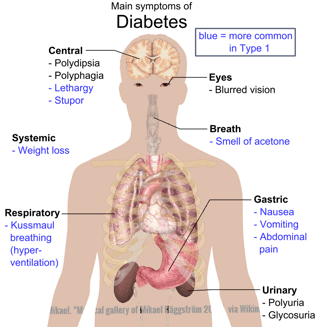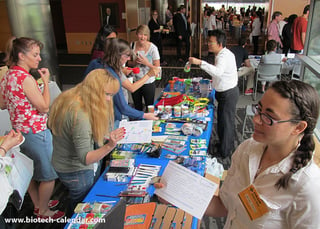Diabetes encompasses a group of metabolic disorders that result in chronically elevated blood sugar levels. If untreated, these diseases can result in serious complications such as ketoacidosis, heart disease, kidney failure, and stroke. The most common type of diabetes is type II diabetes, which accounts for 90-95% of cases (a recent Philadelphia study helped us gain further insight into why type II diabetes occurs). The incidence of type I diabetes is much lower, accounting for just 5-10% of cases. However, while type II diabetes can resolve on its own with changes in diet and exercise habits, type I is considered incurable. Now, a new study from the University of Colorado, Anschutz Medical Campus has identified a new class of antigens that may be a factor in the development of the disease.
Type I diabetes is an autoimmune disease – a condition in which immune cells (T cells) recognize native cells in the body as foreign antigens and respond by attacking them. These dysfunctional T-cells are referred to as “autoreactive”. In the case of type I diabetes, T cells destroy insulin-producing beta cells in the pancreas, causing insufficient insulin  concentrations in the blood and resulting in unregulated blood sugar levels.
concentrations in the blood and resulting in unregulated blood sugar levels.
“Our lab studies the type of T cell known as a CD4 T cell,” said Kathryn Haskins, PhD, author of the study and professor of immunology and microbiology. “We have focused on autoreactive CD4 T cells using a mouse model of autoimmune diabetes. We have been especially interested in identifying the antigens that activate these T cells.”
Haskins and her team closely examined the antigen-containing beta cells, and made a discovery that could be key in determining why they are read as foreign.
The beta cells contained insulin fragments fused together with other proteins. This combination resulted in the presence of “hybrid peptides” not encoded in a person’s DNA. Because the insulin fragments had been modified from their original form, they became targets for T cell attack. This revelation not only has potential for developing treatments for type I diabetes, but it could lead to a better understanding of other autoimmune diseases as well.
 The University of Colorado, Anschutz Medical Campus is continually making breakthroughs in medical research, from understanding diabetes, to cancer treatment, to fighting depression. With such an enormous volume of projects happening at the institution, the university must receive a proportionate amount of yearly funding.
The University of Colorado, Anschutz Medical Campus is continually making breakthroughs in medical research, from understanding diabetes, to cancer treatment, to fighting depression. With such an enormous volume of projects happening at the institution, the university must receive a proportionate amount of yearly funding.
For the 2014-15 year, the Anschutz campus received over $420M on research. This figure is mainly comprised of awards from federal agencies, such as the NIH. Colorado researchers need this funding to spend on replenishing their lab supplies and discovering new technologies that will aid them in achieving their goals.
In order to connect active Colorado researchers with companies who supply the equipment and services they need, Biotechnology Calendar, Inc. will be holding an event at the Anschutz campus later this year.
BioResearch Product Faire™ event at the CU Anschutz Medical Campus – 7/22/16
If you are a lab or chemical supply company interested in exhibiting your laboratory products to 400 life science researchers, visit the link below.
If you are a researcher who would like to find out about the newest innovations available for your lab, click below for more information on attending this free trade fair event.
Would you like to reach two Colorado markets in the same week? Participate in our other Colorado bioresearch show, taking place at the University of Colorado, Boulder, two days prior.




